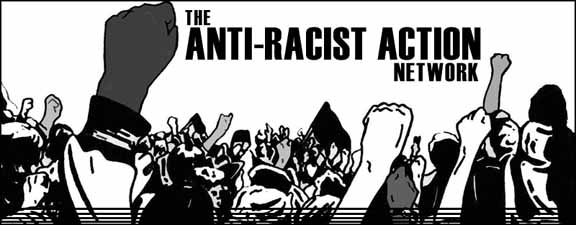What We Call Ourselves
John Ingram, American Renaissance, August 2009
One of the difficulties we have as a movement is that racially conscious whites do not have a satisfactory name. The general public likes to have handy categories into which it can put movements and ideas, and because we do not have a commonly accepted label for ourselves, people have little choice but to use the names chosen for us by our enemies. These are, of course, the usual epithets, such as “racist,” “white supremacist,” and “hate-monger.”
The trouble, as Jared Taylor pointed out long ago, is that what we think about race was so taken for granted by previous generations that they never needed a word for it. Virtually all white Americans, prominent or otherwise, from George Washington to Dwight Eisenhower never had to label their views about race because, to them, they were as natural and normal as breathing.

A band of vicious kin-supremacists.
It was the culture that changed — not the facts about race — and what had been basic common sense for centuries suddenly became known by a slew of ugly names. The word “racist,” for example, wasn’t invented until the 1930s and didn’t become common in the United States until the 1960s. No one would have dreamed of saying Abraham Lincoln had immoral views about race, much less that he was a “racist.” Yesterday’s common sense is now today’s crime, and we have yet to find a generally accepted term that could displace the dishonest formulations others have tried to pin on us.
It is possible to imagine a comparable situation in a collectivist future in which people with children are required to join group-rearing camps where adults must treat all children equally. Parents who care more about their own children or just want to spend more time with them are shunned and called names: “kin-supremacists,” “familists,” “kinder-phobes,” “haters.” What word would these “kin-supremacists” come up with to refer to people who love their own children more than the children of strangers? They would face the same problem we do because no previous generation ever had to invent a word to describe people with normal, healthy feelings.
The media’s insistence on the term “white supremacist” for anyone who departs from multiracial dogma is especially annoying. It evokes — as it is meant to — whip-cracking slave drivers, lynch mobs, and Jim Crow, and only maliciousness or ignorance explains its current use. I have spoken to editors who admitted they haven’t considered why they use the term — only that they have done so in the past, and keep doing so out of habit.
The media invariably call a criminal with swastika tattoos a “white supremacist,” especially if he barks “white power” while being arraigned. Even then, what does the term really mean? Does any white person in America really want to rule over people of other races, as the term “white supremacist” suggests? People who shout “white power” mostly just want to get away from non-whites.
Of course, by reserving the term “white supremacist” for anyone who dissents from racial orthodoxy, the left tries to give the impression that readers of American Renaissance are all dying to tattoo themselves, march around in jackboots, and beat up immigrants, but manage barely to restrain themselves through a colossal act of will that could fail at any time. The clear implication is that people who study racial differences in IQ or care about the survival of whites and their culture are morally no different from thugs who chain blacks to pickup trucks and drag them to death.
This kind of treatment is especially odious in that groups like La Raza and the NAACP get the beatific label of “civil rights” groups. Any white organization that copied the goals and tactics of La Raza perfectly but substituted “white” for “Hispanic” would be nothing more than a band of hate-mongers.
So, how should we refer to ourselves?
First, we can never accept being called “racists.” Ten years ago, Sam Francis wrote in this magazine that “racism” is a “term originating on the left, and has been so defined and loaded with meanings the left wants it to have that it cannot now be used by the supporters of white racial consciousness for any constructive purpose.” Nothing has changed since then.
Over the years, various names have been proposed: white nationalist, white separatist, race realist, racial preservationist, “racialist” (instead of “racist”), racially conscious white person, and modifiers such as “pro-white” and “racially conscious.”
These are not awful terms, but they have shortcomings. “White nationalist” and “white separatist” are bold, but rattle too menacingly to gain widespread acceptance. The words “nationalism” or “separatism” have a coercive or even violent ring. Basque, Kurdish, Tamil, and other nationalists have been known to throw bombs. “Separatism” could almost be construed as ethnic cleansing through house-to-house raids, even if an actual white separatist has something gradual, peaceful, and voluntary in mind.
Both separation and nationalism ultimately suggest redrawing boundaries, and that is unsettling to many. For those with the means and the mettle — and an opportunity to explain what they really mean — perhaps these are acceptable terms, but for us wage-earners in the suburbs they are too provocative.

The trouble with “European American” is that some of us aren’t very “European.”
I like “racialist,” though the addition of one syllable to “racist” isn’t likely to change many minds, and most people have no idea what the difference is. In Britain, the two terms are reportedly interchangeable.
“Racially conscious white person” is nice but cumbersome, though I do appreciate the left-fake of “conscious.” I recall hearing a black public official say she thought “racially conscious” simply meant anti-racist, that having a “consciousness” of race meant understanding how wonderful black people are, and how evil whites are. In any case, liberals love consciousness — of the sorrows of the poor, of the plight of the whales, of the agonies of AIDS carriers — so the idea of white consciousness confuses them, but it is hard to work the concept into a crisp, useful term.
Some on our side have suggested abandoning “white” for “European-American” or “Euro-American” but most American whites, for better or worse, don’t think of themselves as “European.” A European is a snooty fellow named Pierre who wears a beret. At the same time, hyphenation is an awkward concession to the left and, at worst, the term can sound like a euphemism: an equivalent of “African-American” for whites who aren’t willing to admit they are white.
“Pro-white” would have some potential if it could work its way into the debate as did the terms the antagonists in the abortion debate managed to promote. “Pro-choice” and “Pro-life” cleverly stake out a “pro” rather than “anti” position, but it took millions of dollars and supporters to get those terms into circulation. “Pro-choice,” especially, is a tour de force; it means nothing at all, but had enough media behind it to replace the more sinister “pro-abortion.”
“Pro-white” has the advantage of meaning exactly what it says, but in today’s climate it would instantly be turned into a weapon, with the implication that the only way anyone could be pro-white was by being anti-black and anti-everything-else. This puts it in the same potentially menacing category as “white nationalist” and “white separatist.”
This leaves us is with “race realist.” It is a good term, and American Renaissance has made some progress in promoting it, but it has shortcomings. First, it has to be explained, since it has no obvious meaning. Second, and perhaps worse, it is clearly a term invented by its own proponents. No hostile or even neutral party calls other people “realist,” or “objective,” or “virtuous,” or any other positive thing, and when people give themselves names like that it strikes outsiders as a pose.
Ayn Rand claimed that she and her followers were Objectivists. That name says nothing about what she thought except that she thought highly of herself. Likewise, American socialists and loonies of various stripes like to call themselves Progressives, a name that would provoke much snickering if the press were not so partisan. Merely calling yourself “progressive” does not mean your policies would bring progress, and claiming to be a realist — even if you are — means nothing to those who disagree.
The worst examples of this kind of inflated self-naming are the various Muslim groups that call themselves, in effect, The Earthly Executors of God’s Will. “Race realist” is nothing like that, of course, but it is not a term our enemies would ever adopt nor one that even the merely curious are likely to accept. We will never be more than “so-called” or “self-proclaimed” race realists to any but our friends.
Obviously, a name should have some connection to beliefs or goals. I say “obviously,” though some might argue that subterfuge is better. Why name yourself at all and give your opponents a target? Because it is very useful to have a label that both we and our opponents can live with and that accurately conveys our views. At the same time, our goals and positions are entirely legitimate. We have nothing to hide, and should describe ourselves accurately.
We have disagreements among ourselves, of course, but there are probably a few points on which all can agree, and it is vital to prevent gross misconception of our goals. Our central position is that the races are different. They are not equivalent and replaceable, and whites are uniquely harmed by this myth.
It is important also that we not shy away from the racial aspect of our positions.
We oppose affirmative action, for example, not especially because it casts suspicion on the legitimate accomplishments of some minorities, but because it is unfair to whites. We oppose unchecked immigration, not because we want to see everyone wait in line, but because it displaces whites. We oppose high taxing and spending, perhaps because we believe in fiscal discipline and free markets, but also because they are largely a transfer of wealth from whites to non-whites. And we want “law and order,” not only because any society must have rules, but also because the disorder often comes from non-whites and we rightly deplore it.
We seek true freedom of association, not forced involvement with other groups. Third-World immigration, “civil rights” laws, and school busing are examples of coercion we oppose. Put differently, we want to be left alone. These are worthy, legitimate, necessary goals, and in a sane world would raise no objections at all.
The left senses the racial element in these positions, of course. That is why, when tax protesters put on their “Tea Parties” last April 15, opponents insisted that their motives could not be purely financial and warned that the gatherings were “racist.” As usual, so-called conservatives shrieked that they were not “racist” at all, and the white cause made no progress.
A better name for us, and the willingness of more whites to accept it, would put an end to this silly game of Whack-A-Mole. To the list of names others have suggested, I propose one I think is better: “white advocate.” This term, along with “white advocacy,” has a number of advantages.
First, it does away with the dissembling inherent in words like “conservative” or “patriot.” Indeed, a “white advocate” could be otherwise a liberal, and have little sympathy for the militarism or flag-waving that are often called patriotism. Second, the term puts “the W word” right where it belongs. No one is misled. Third, it does not have a frightening ring. It suggests a person who speaks up for whites by pointing out injustices done to them, and formulating policies necessary to correct them. Fourth, it is flexible. It does not suggest any specific policy goal, thus leaving room for internal disagreement, and permitting shifts in strategy according to circumstances. A white advocate may wish to repeal all anti-discrimination laws or may simply object when whites are called “rednecks.”
The term “white advocate” has the final advantage of laying the foundation for more accurate descriptions of other groups. The NAACP and MALDEF are not “civil rights” organizations. No one reads about their activities and assumes that they are trying to secure rights for all Americans. They are, respectively, black advocacy and Hispanic advocacy groups, and we should have no objection to their using a variant of the term we use for ourselves. Where there is advocacy there is inevitably conflict. By accurately classifying these so-called “civil rights” groups we make it clear that the interests of blacks and Hispanics will sometimes conflict with those of whites — and that whites have interests of their own that must be protected.

Rabble do not choose names for us.
Toward the end of his excellent documentary, “A Conversation on Race,” filmmaker Craig Bodeker laments that whites are allowed only two stances on race: total indifference to it or cruel, bloodthirsty “racism.” Anyone who even hints that whites may have group rights is condemned to the latter category.
Mr. Bodeker is right, and if whites are headed anywhere but to oblivion, this false dichotomy must be destroyed. Whites face an array of serious problems that the media, culture, and politics insist on ignoring. Those who seek justice for whites deserve a name equal to the moral stature and dignity of their cause.















